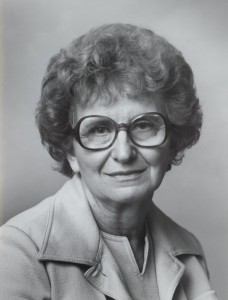Emalea Pusey Warner and Mae Carter championed the treatment and rights of women at the University of Delaware with great success. The programs they created, though fifty years apart, played crucial roles in the establishment and continuation of higher education for women at the University and served as models throughout the state of Delaware.
Emalea Pusey Warner never went to college herself; she married Alfred D. Warner, the president of his family’s Wilmington shipping firm, when she was nineteen. She became one of the most enthusiastic members of the Wilmington New Century Club, a women’s club seeking social reform, and worked tirelessly towards bringing more educational opportunities to women of all ages. In 1910 when President Harter of Delaware College proposed his plan for the Women’s College, Emalea Warner was given the position of Chairwoman of the Education Committee and appointed as one of the commissioners (the only female) of the group overseeing the building of the Women’s College. She was instrumental in finding a dean, faculty, and student body in 1913 when the Delaware General Assembly passed the Women’s College Bill. Furthermore, she was chosen to be the first woman on the Board of Trustees of the University of Delaware in 1928. Without Emalea Warner, there would have been no inaugural celebration of the opening of the Women’s College on October 10th, 1914. In recognition of Emalea Warner’s dedication to the higher education for women at the University of Delaware, Residence Hall (where the female students lived in the Women’s College) was renamed as Warner Hall.
Mae Carter was passionate about offering equal opportunities for higher education to mature women: adult women who had never been to college or were seeking to continue their education. She was hired by the University of Delaware as a counselor to assist these women in attending college. From this part-time, marginal, non-faculty position, Mae Carter revolutionized the educational opportunities for women at the University of Delaware. In 1967, she instituted a program called “Great Expectations for Women,” aimed at returning female students, that was so successful it was also used in Georgetown and Dover.

Mae Carter (Image from the UD Awards page). A scholarship, in honor of Mae Carter, former Assistant Provost for Women’s Affairs and Executive Director of the Commission on the Status of Women, is awarded to an undergraduate woman student at the University who carries the values that Mae Carter has represented to the University community of women.
Mae Carter chaired the Women’s Studies Committee when it was created in 1971 and worked with other faculty members to create the first Women’s Studies course; when it was a success, she pushed for the inclusion of Women’s Studies as a permanent, funded program of the University. Mae Carter left the Women’s Studies Committee in 1973 to lead the newly created Commission on the Status of Women to support the equal treatment of women at the University. Five years later, the Commission created the Office of Women’s Affairs, an administrative branch, which was headed by Mae Carter. In this position, she established, among other things, the Women of Promise and Women of Excellence awards and dinners for outstanding female students at the University of Delaware, both of which continue today. In honor of her enormous contributions to the University of Delaware female community, the University annually awards a $1,500 scholarship to a female undergraduate student who shares Mae Carter’s zeal for the educational rights of women.
University of Delaware Awards: Mae Carter Scholarship
Beneath Thy Guiding Hand: A History of Women at the University of Delaware
By Rebecca Selig, Art Conservation and Anthropology double major, in the Honors Program
